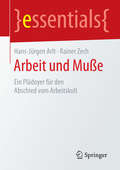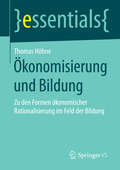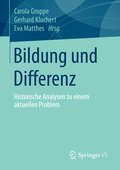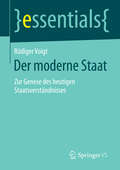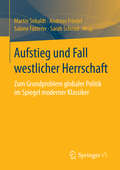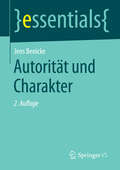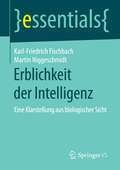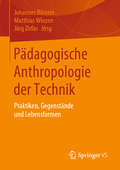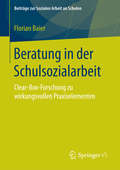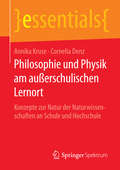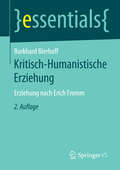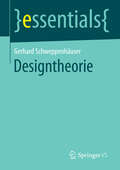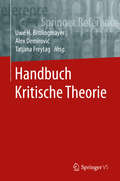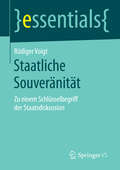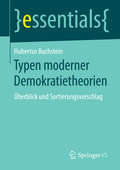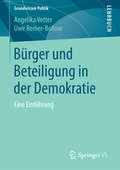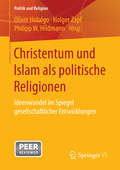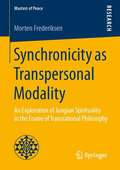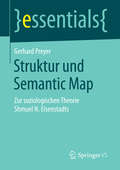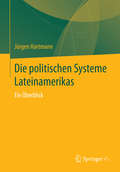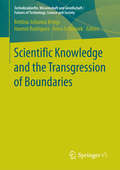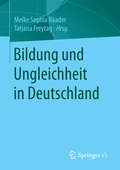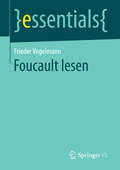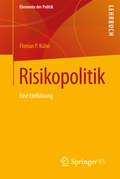- Table View
- List View
Arbeit und Muße: Ein Plädoyer für den Abschied vom Arbeitskult (essentials)
by Hans-Jürgen Arlt Rainer ZechDie Autoren erläutern, wie moderne Gesellschaften die Arbeitstätigkeit einerseits zum Lebensmittelpunkt der Menschen und andererseits zum Kostenfaktor der Wirtschaft machen, und thematisieren die soziale Frage, die aus dieser Spannung erwächst. Eine kurze Begriffsarchäologie von Arbeit und Muße lässt deutlich werden, wie eigenartig und einzigartig dieses Weltbild ist, aus dem Leistungsexplosionen und Zerstörungen in vorher unvorstellbaren Ausmaßen entspringen. Hans-Jürgen Arlt und Rainer Zech stellen Alternativen vor: Arbeit in die Schranken des Not-Wendigen verweisen, Tätigkeiten in bunter Vielfalt am selbstbestimmten Bedarf orientieren, der Muße als Ausdruck idealer Humanität Geltung und die Lebensführung verschaffen.
Ökonomisierung und Bildung: Zu den Formen ökonomischer Rationalisierung im Feld der Bildung (essentials)
by Thomas HöhneÖkonomisierung als Rationalisierung im Arbeits- und Produktionsbereich stellt ein kapitalistisches Grundprinzip dar, das seit den 1980er Jahren zunehmend auf außerökonomische Bereiche übertragen wird. Vorangetrieben wird diese Entwicklung national sowie international vor allem durch Staat, Politik und transnationale Akteure, die zunehmend ökonomische Steuerungsmittel wie Evaluation und Indikatorensteuerung in den Bildungsbereich einführen. Primäres Ziel ist es, Wettbewerb systematisch im Bildungssystem als Entwicklungsinstrument zu etablieren. Hierdurch sollen marktähnliche Strukturen - sogenannte Quasi-Märkte - geschaffen werden, deren bildungsökonomisches Ziel insgesamt eine nachhaltige Steigerung der gesamtgesellschaftlichen Produktivität von Bildung ist.
Bildung und Differenz: Historische Analysen zu einem aktuellen Problem
by Carola Groppe Gerhard Kluchert Eva MatthesIn der empirischen Bildungsforschung wie in der erziehungswissenschaftlichen Diskussion spielt die Aufklärung des Zusammenhangs von Bildung und Differenz eine wichtige Rolle. Der Band, hervorgegangen aus einer Tagung der Sektion Historische Bildungsforschung in der Deutschen Gesellschaft für Erziehungswissenschaft, will zu dieser Aufklärung beitragen, indem er die Problemanalyse um die historische Dimension bereichert und die Wechselbeziehung von Bildung und Differenz in ihrer Entstehung und Veränderung erfasst. Dabei werden unterschiedliche Differenzkategorien wie soziale Herkunft, Geschlecht, Behinderung und ethnische Zugehörigkeit in den Blick genommen und unterschiedliche Aspekte von Bildung berücksichtigt.
Der moderne Staat: Zur Genese des heutigen Staatsverständnisses (essentials)
by Rüdiger VoigtRüdiger Voigt gibt in diesem Essential einen Überblick über die Geschichte europäischen Staatsdenkens anhand ausgewählter Staatsdenker. Er leitet zentrale Begriffe der Staatsdiskussion wie Macht, Herrschaft, Souveränität, Gesellschaftsvertrag, Freiheit, Sicherheit und Bürokratie her und bettet die traditionelle Staatsdiskussion in gravierende Probleme unserer Zeit wie beispielsweise Terrorismus sowie Überwachung.
Aufstieg und Fall westlicher Herrschaft: Zum Grundproblem globaler Politik im Spiegel moderner Klassiker
by Martin Sebaldt Andreas Friedel Sabine Fütterer Sarah SchmidDer Sammelband analysiert Aufstieg und Fall westlicher Herrschaft als globales Grundproblem. Durch die Vorstellung von zwölf modernen Klassikern zu diesem Thema, die sich durch besonderen theoretischen und empirischen Mehrwert auszeichnen, wird die Vielfalt der Erklärungsansätze erschlossen. Diese setzen sowohl bei geographischen und natürlichen Ressourcen an, wie auch bei kulturellen Errungenschaften und Werten. Wieder andere stellen Institutionen und Organisationsmuster als entscheidende Determinanten heraus. Letztlich wird damit deutlich, dass Aufstieg und Fall westlicher Herrschaft nur multikausal zu begreifen sind. Die vergleichende Abschlussbetrachtung liefert dafür einen systematischen Ansatz.
Autorität und Charakter (essentials)
by Jens BenickeJens Benicke untersucht anhand der Theorie der autoritären Persönlichkeit, warum sich Menschen freiwillig Autoritäten unterordnen. Diese Fragestellung soll Aufschluss darüber geben, warum bestimmte Personen anfällig sind für faschistisches Gedankengut. Aufbauend auf den ideengeschichtlichen Voraussetzungen des historischen Materialismus, der Massenpsychologie und der Psychoanalyse wurden in der Theorie spezielle Charaktertypen entwickelt, die aufgrund ihrer frühkindlichen Sozialisation in einer hierarchisch strukturierten, kapitalistischen Gesellschaft zu autoritären Einstellungen neigen. Empirisch nachweisbar wurde dieser potenziell faschistische Charakter durch die F-Skala, die in den ,,Studien zum autoritären Charakter" entwickelt wurde. Aus Kritikpunkten an diesem Konzept entwickelten sich später neue Autoritarismustheorien, die hier kurz zusammengefasst werden.
Erblichkeit der Intelligenz: Eine Klarstellung aus biologischer Sicht (essentials)
by Karl-Friedrich Fischbach Martin NiggeschmidtDieses Kompendium greift ein umstrittenes Thema auf: Ist Intelligenz erblich? Bei der Beantwortung dieser Frage geraten selbst Fachleute ins Schwimmen. Schuld daran sind missverständliche Fachbegriffe und überzogene Vorstellungen von der Aussagekraft des in der Intelligenzforschung genutzten Erblichkeitsmodells. Karl-Friedrich Fischbach und Martin Niggeschmidt erläutern das Modell aus Sicht der Biologie - jenes Wissenschaftsbereichs also, in dem es ursprünglich entwickelt wurde. Wer sich die Logik des Modells vergegenwärtigt, stellt fest: Intelligenz als ,,erblich" zu bezeichnen, ist unpräzise und irreführend.
Pädagogische Anthropologie der Technik: Praktiken, Gegenstände und Lebensformen
by Johannes Bilstein Jörg Zirfas Matthias WinzenDer Band geht der Frage nach, welche spezifisch edukativen Techniken angesichts der zunehmenden Etablierung und Professionalisierung der pädagogischen Arbeitsfelder erforderlich werden. In diesem Zusammenhang wird zu klären versucht, welche pädagogische und didaktische Vorbereitung auf eine zunehmend technisch orientierte Welt erfolgen muss. Zudem werden die alltäglichen Techniken der Selbstsorge analysiert. Und schließlich geht es in einer Pädagogischen Anthropologie auch um die Frage, wer Subjekt und Objekt der Technik ist.
Beratung in der Schulsozialarbeit: Clear-Box-Forschung zu wirkungsvollen Praxiselementen (Beiträge zur Sozialen Arbeit an Schulen #6)
by Florian BaierIn diesem Buch wird ein vom Schweizerischen Nationalfonds (SNF) gefördertes Forschungsprojekt vorgestellt, in dem der Frage nachgegangen wurde, wie in Schulsozialarbeit und Jugendarbeit Wirkungen und Nutzen erzeugt werden. Das Projekt wurde als Clear-Box-Forschung konzipiert und in einer Kleinstadt in der Schweiz durchgeführt. Es wurden verschiedene qualitative und quantitative Methoden eingesetzt (Videographie, Interviews, Beobachtungen, standardisierte Befragungen). Die Ergebnisse des Projekts liefern Impulse auf drei Ebenen: erstens leisten sie einen Beitrag zur weiteren Professionalisierung der beiden Handlungsfelder, zweitens tragen die theoretischen Generalisierungen zu einem vertieften Verständnis von Schulsozialarbeit und Jugendarbeit bei und drittens werden forschungsmethodologische und erkenntnistheoretische Herausforderungen der Kombination verschiedener Erhebungsmethoden aufgezeigt.
Philosophie und Physik am außerschulischen Lernort: Konzepte zur Natur der Naturwissenschaften an Schule und Hochschule (essentials)
by Annika Kruse Cornelia DenzDieses essential zeigt am Beispiel des innovativen Projekts ,,Selberdenken!" auf, wie eine Verbindung von Naturwissenschaft und Philosophie auf der Basis von forschend-entdeckendem Lernen und explorativem Experimentieren an Schule und Hochschule gelingt. Fragen wie ,,Was denkt man, wenn man nach den Bausteinen der Materie sucht?" und ,,Wie schafft man es, Daten durch die Luft zu transportieren?" bieten dabei das Potenzial, Jugendliche für ein tiefgreifendes Verständnis unserer technisierten Welt zu begeistern. Motor für diese kritisch-neugierige Perspektive ist die Naturphilosophie, die auf lebendige Weise neben der fachlichen Dimension auch die Hintergründe von Naturwissenschaft thematisiert.
Kritisch-Humanistische Erziehung: Erziehung nach Erich Fromm (essentials)
by Burkhard BierhoffKann Erziehung freie Menschen hervorbringen? In diesem "Erziehungs-Manifest" sollen einige Argumentationslinien Erich Fromms nachvollzogen und für die Pädagogik als Wissenschaft und Praxis erschlossen werden. Eine gelungene Erziehung im Sinne von Fromm hilft dem Menschen, eine authentische Identität zu entwickeln, fördert seine kritischen Fähigkeiten und unterstützt den kreativen Ausdruck seiner Persönlichkeit. Ziel ist der freie Mensch, der gegenüber Manipulation und Einschüchterung immun ist und sich mit Liebe und Vernunft der Welt zuwendet. Die Beschäftigung mit Fromm bietet für ein solches Erziehungskonzept viele produktive Anregungen.
Designtheorie (essentials)
by Gerhard SchweppenhäuserDas essential bietet eine ideengeschichtliche Erkundung moderner Konzepte von Design. Es schlägt Positions- und Kursbestimmungen für ein zukunftsfähiges Design vor und diskutiert Aspekte des engen und des erweiterten Designbegriffs. Die Ambivalenz von Design zwischen Entwurf für den bestehenden Bedarf und Entwurf eines noch nicht Seienden wird philosophisch fruchtbar gemacht.
Handbuch Kritische Theorie: Alte Und Neue Auswege? (Springer Reference Sozialwissenschaften Ser.)
by Tatjana Freytag Uwe H. Bittlingmayer Alex DemirovićDas Handbuch Kritische Theorie beleuchtet aus ganz unterschiedlicher Perspektive, was Kritische Theorie heute bedeuten kann. Das Handbuch reklamiert, trotz seines Umfangs, keine eindeutige oder definitorische Antwort auf die Frage, was Kritische Theorie heute ist oder zu sein hat. Die Programmatiken Kritischer Theorie sind in den letzten 85 Jahren weder konstant geblieben noch lässt sich Kritische Theorie auf die Interpretation eines Kanons von Texten festlegen. Gleichwohl sind Kritische Theorie und die Bezugnahmen auf sie nicht beliebig, sondern, so die Überzeugung der Herausgeber*in, bei allen Auseinandersetzungen um die richtige Interpretation und institutionelle Praxis, mehr als eine „bloße Metapher“. Im Zentrum steht nach wie vor die Diskrepanz zwischen dem Ausmaß an real vorhandenen und in gesellschaftliche Institutionen gegossenen Herrschaftsverhältnissen einerseits und den Möglichkeiten der (radikalen) Verringerung von Herrschaft von Menschen über sich, über andere und über Natur andererseits. In diesem Grundverständnis sind sich – bei aller Heterogenität – die im Handbuch versammelten Beiträge und Beitragenden einig.
Scenographies of the Subject: Constructions And Performances Of The Self
by Céline Kaiser Lars Friedrich Karin HarrasserUnder what circumstances do subjects become visible? And how do subjects themselves change and move the circumstances that allow them to appear? Rather than describing medial, architectural, or rhetorical arrangements that are readily available to subjects, or concentrating on the processes of subject constitution without their scenic arrangements, this volume is dedicated to the reciprocal production of both subjects and scenes. From various perspectives, it underlines the abysmal conditions in which subjects arrive on stage and vice versa the stages arrive at their subjects. Through articles that analyze concrete scenes in a highly-focused manner and question the concept of the scene itself, this volume argues that there is not subject without a scene, and no scene without an instance of description. Based on this thesis, this volume investigates antique drama and revolutionary rhetoric, therapeutic and bureaucratic facilities, experiments in fine art and film, and, not least, scenes of theory: rhetorical stages that perform arguments and politics.
Staatliche Souveränität: Zu einem Schlüsselbegriff der Staatsdiskussion (essentials)
by Rüdiger VoigtDas essential erläutert zunächst die Begriffsgeschichte und Bedeutung der Souveränität für den Staat des 21. Jahrhunderts und beschreibt die drei Typen Parlamentssouveränität, Rechts- bzw. Verfassungssouveränität sowie (direkte) Volkssouveränität. Anschließend analysiert der Autor den Begriff der nationalstaatlichen Souveränität im Kontext der Globalisierung, Internationalisierung sowie Europäisierung und stellt die Auswirkungen des globalen Finanzkapitalismus auf die nationalstaatliche Souveränität dar. Die Übertragung von Kernkompetenzen an die Europäische Union bei gleichzeitigem Souveränitätsverlust der Mitgliedstaaten und die Kontroverse zwischen Universalisten, Nationalisten und Partikularisten werden kritisch diskutiert. Abschließend liefert das essential Ansatzpunkte zu einer Erneuerung der Volkssouveränität im demokratischen Rechtsstaat.
Typen moderner Demokratietheorien: Überblick und Sortierungsvorschlag (essentials)
by Hubertus BuchsteinDas essential bietet einen kompakten Überblick über die neuere Entwicklung der Demokratietheorie und nimmt eine prägnante Sortierung der gegenwärtigen Theorien in diesem Bereich vor. Hubertus Buchstein erläutert die methodischen Unterschiede zwischen den konkurrierenden demokratietheoretischen Ansätzen und stellt vier grundlegende Typen moderner Demokratietheorien vor: historische, empirische, formale und normative Demokratietheorien. Viele Debatten in der Öffentlichkeit, der Politischen Bildung und der Politikwissenschaft über die Demokratie lassen sich mit mehr Gewinn führen, wenn man die unterschiedlichen Blickwinkel der vier Typen beachtet. Dieses essential liefert einen wichtigen Beitrag dazu.
Bürger und Beteiligung in der Demokratie: Eine Einführung (Grundwissen Politik)
by Angelika Vetter Uwe Remer-BollowDas Lehrbuch richtet sich an Studierende und Lehrende, die sich mit B#65533;rgerbeteiligung und politischer Partizipation in Deutschland und anderen Demokratien besch#65533;ftigen. Dazu geh#65533;ren unter anderem Wahlen, B#65533;rger und Volksentscheide, informelle Formen der Beteiligung. Das Buch bietet einen umfassenden #65533;berblick #65533;ber die demokratietheoretischen Grundlagen, die institutionellen Rahmenbedingungen und die relevanten Theorien zur Erkl#65533;rung von Beteiligung. Dabei werden die wichtigsten Formen der politischen Partizipation und B#65533;rgerbeteiligung hinsichtlich ihrer theoretischen und strukturellen Eigenschaften einzeln dargestellt. Zahlreiche empirische Daten und Interpretationen erg#65533;nzen die Ausf#65533;hrungen und vermitteln ein aktuelles Bild der Beteiligungslandschaft.
Christentum und Islam als politische Religionen: Ideenwandel im Spiegel gesellschaftlicher Entwicklungen (Politik und Religion)
by Oliver Hidalgo Philipp W. Hildmann Holger ZapfDer Band untersucht wichtige Stationen des Wandels politisch-religi#65533;ser Ideen im Christentum und im Islam als ideelle Anpassungsleistungen an die sich stetig ver#65533;ndernden gesellschaftlichen Rahmenbedingungen bzw. auch als Gestaltungsversuche des Politischen auf Basis theologischer Pr#65533;missen. Damit leistet das Buch einen zentralen Beitrag zum Verst#65533;ndnis der genuin politischen Dimension von Religionen unabh#65533;ngig von beobachtbaren S#65533;kularisierungsprozessen und m#65533;glichen institutionellen Trennungen zwischen Staat und Kirche. Die versammelten Aufs#65533;tze loten konzeptionelle und methodische Zugangsm#65533;glichkeiten zum Themenfeld aus und erschlie#65533;en den politisch-religi#65533;sen Wandel in Christentum und Islam zum Teil in Einzelfallanalysen, zum Teil in vergleichender Perspektive.
Synchronicity as Transpersonal Modality: An Exploration of Jungian Spirituality in the Frame of Transrational Philosophy (Masters Of Peace Series)
by Morten FrederiksenThe author explores Carl Gustav Jung’s elusive notion of synchronicity from a transrational perspective and relates synchronicity to the transpersonality of the "All-One". This is done by expanding the content and meaning of Wolfgang Dietrich´s layers of Elicitive Conflict Mapping (ECM) through re-relating them to Ken Wilber´s model of the structures of consciousness; with synchronicity as the literal connecting principle. The result, then, is an expanded notion of the transrational peace philosophy which includes Wilber´s model of stages shorn of its evolutionary slant and fathoms synchronicity in its theoretical outlook and practical application.
Struktur und Semantic Map: Zur soziologischen Theorie Shmuel N. Eisenstadts (essentials)
by Gerhard PreyerGerhard Preyer rekonstruiert in diesem essential den harten Kern von Shmuel N. Eisenstadts allgemeiner Soziologie, wie Eisenstadt sie in der Untersuchung der Beziehung zwischen Handeln (Kreativit#65533;t) und Struktur sowie zwischen Kultur und Sozialstruktur durchgef#65533;hrt hat. Preyer ordnet seine Untersuchung in dem von ihm sogenannten ,,semantischen Map" als eine evolution#65533;re Universalie des ,,konstitutiven basalen Bezugsrahmens" der Erforschung der sozio-strukturellen Evolution an. Aus Eisenstadts Sicht legen die grundlegenden semantischen Maps das zentrale Problem der menschlichen und der sozialen Existenz, die Spezifikation ihrer L#65533;sungen und die Beziehung zu den grundlegenden Annahmen #65533;ber die soziale Ordnung fest. Das Semantic Map und der Kampf um die Verteilung von Ressourcen ist der forschungsprogrammatische Bezugsrahmen seiner Reformulierung der Modernisierungstheorie, der Kritik an der klassischen Modernisierungstheorie als einer Konvergenztheorie und seiner Fassung des Problems der sozialen Ordnung. Die Studie wird mit einer Modifikation von Eisenstadts Ansatz einer mitgliedschaftstheoretischen Reinterpretation abgeschlossen.
Die politischen Systeme Lateinamerikas: Ein Überblick
by Jürgen HartmannDieses Buch behandelt alle politischen Systeme Lateinamerikas und folgt der Idee, eine Balance zwischen länderübergreifender Perspektive und individualisierender Länderstudie herzustellen. Nach einem generalisierenden Überblick werden die dort angeschlagenen Themen in 20 Länderkapiteln wieder aufgegriffen. Die Länderkapitel schildern in chronologischer Darstellung zunächst die Vorgeschichte des aktuellen politischen Systems. Anschließend werden die politischen Institutionen, insbesondere das Regierungs- und das Parteiensystem vorgestellt und ferner die politischen Kursentscheidungen und Handlungsmöglichkeiten in der Wirtschaftspolitik und bei der Armutsbekämpfung skizziert.
Scientific Knowledge and the Transgression of Boundaries
by Bettina-Johanna Krings Hannot Rodríguez Anna SchleisiekThe aim of this book is to understand and critically appraise science-based transgression dynamics in their whole complexity. It includes contributions from experts with different disciplinary backgrounds, such as philosophy, history and sociology. Thus, it is in itself an example of boundary transgression. Scientific disciplines and their objects have tended to be seen as permanent and distinct. However, science is better conceived as an activity that constantly surpasses, erases and rebuilds all kinds of boundaries, either disciplinary, socio-ethical or ecological. This transgressive capacity, a characteristic trait of science and its applications, defines us as "knowledge societies. " However, scientific and technological developments are also sources of serious environmental and social concerns.
Bildung und Ungleichheit in Deutschland
by Meike Sophia Baader Tatjana FreytagAnliegen des Bandes ist es, aufzuzeigen, wie multifaktoriell Bildungsungleichheit ist. Er kann auch als ein Beitrag der Bildungsforschung zur aktuellen R#65533;ckkehr der Kategorie der sozialen Ungleichheit angesichts un#65533;bersehbarer gesellschaftlicher Abkoppelungsprozesse gesehen werden. Die herausragende Bedeutung von Bildung f#65533;r die Lebensperspektiven junger Menschen in Deutschland ist unbestritten. Der Erwerb schulischer und beruflicher Bildungsqualifikationen spielt eine Schl#65533;sselrolle im sozialen Integrationsprozess. Bildungsabschl#65533;sse sind entscheidend f#65533;r die Chancen auf gesellschaftlich anerkannte Positionen, auch wenn Bildung allein l#65533;ngst kein Garant mehr daf#65533;r darstellt. Da sich die Auswirkungen von sozialer Benachteiligung jeweils kumulativ-kontextuell darstellen, werden die Bereiche Familie und Kindheit, Schule und Hochschule sowie au#65533;erschulische Bildung und Weiterbildung in den Blick genommen und es wird nach Durchquerungen, Genderaspekten, Intersektionalit#65533;t und Inklusion gefragt.
Foucault lesen (essentials)
by Frieder VogelmannDieses essential stellt einen systematischen und philosophischen Lekturevorschlag zur Diskussion: Systematisch werden Foucaults Schriften von seiner methodologischen Perspektive her als nihilistische, nominalistische und historizistische Analyse von Praktiken und den in ihnen produzierten Wirklichkeiten entlang der drei Achsen des Wissens, der Macht und der Selbstverhaltnisse gedeutet. Die Konsequenzen dieser Interpretation werden anhand der Positionen umrissen, die sich in Bezug auf Foucaults Kritikbegriff, seine Attacke auf die Human- und, als Teil davon, die Sozialwissenschaften und sein Verhaltnis zum Neoliberalismus ergeben. Philosophisch ist dieser Lekturevorschlag, weil er die Historisierung von Wahrheit als Kern von Foucaults philosophischem Verfahren behauptet. "
Risikopolitik: Eine Einführung (Elemente der Politik)
by Florian P. KühnDieses Lehrbuch führt ein in die politischen Zusammenhänge der Wahrnehmung von Risiken, des politischen Umgangs mit ihnen und in die gesellschaftswissenschaftlichen Möglichkeiten, diese Politik zu analysieren. Neben der Frage, welche Risiken existieren und wie ihnen begegnet werden kann, thematisiert das Buch die Kategorien, nach denen Risiken erkannt und in der Öffentlichkeit diskutiert werden. Es zeigt, wie Risiken verstanden werden können, wie ihnen begegnet wird sowie welchen Bedingungen organisierter Herrschaft Risikopolitik entspringt. An den Beispielen Krieg, Gesundheit, Terrorismus und Entwicklungspolitik wird veranschaulicht, welche Auswirkungen Risikoerwägungen auf internationale Politik ebenso wie auf gesellschaftliche Prozesse haben.
